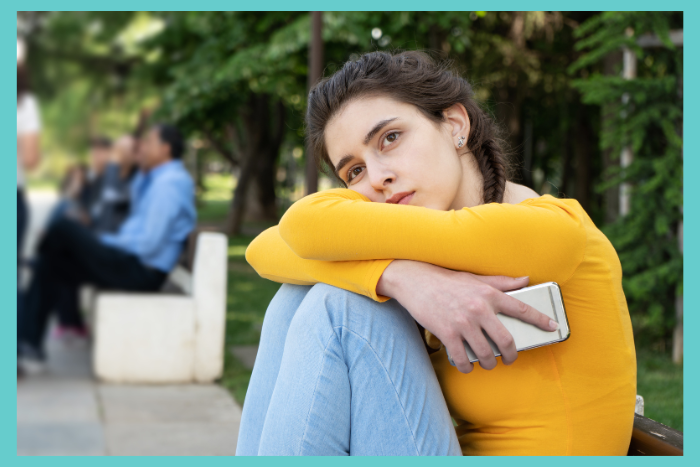It’s common for teenagers in need of mental health treatment to start with one-on-one weekly therapy sessions. But when should parents consider more intensive treatment? We talked with local therapists about when to consider more acute interventions such as an intensive outpatient program (IOP) or partial hospitalization program (PHP). They provided insight into the signs parents should look for and offered recommendations on when to seek more intensive treatment for a teen experiencing symptoms of depression, anxiety, or other behavioral health challenges.
Embrace U’s outpatient programs are designed to help adolescents (ages 10-18) quickly develop coping and communication skills so they can manage symptoms of a mental health condition. We combine psychiatry with individual therapy, group therapy, and a parent support group to help families heal. Our clinical staff includes licensed therapists, board-certified psychiatric providers, and a registered nurse, all with years of experience in adolescent mental health. Our services are covered by insurance plans.
Call us at 615-656-8624 for more information.
How to Determine When a Teen Needs More Intensive Treatment
Determining the appropriate level of care for teenagers experiencing symptoms of a mental health condition requires consultation with a behavioral health expert. Placing a teenager in a residential program as a first step can be as big of a mistake as ignoring signs that indicate they need professional help. When families aren’t seeing progress or have questions about their treatment plan, they should ask their mental health provider questions and revisit their treatment goals. If a child is going to therapy once a week with no sign of progress the next step could be increasing sessions to twice a week, or considering a more intensive treatment program that offers group and individual therapy with psychiatric support. If the current level of treatment isn’t working it may be time to move to the next level.
“I always recommend that parents talk about this with their child’s provider and share their concerns,” said Laura Deneen, LPC-MHSP, CEDS-S, NCC, therapist and founder of Anchored Counseling. “We ideally want everyone to be on the same page in terms of the treatment plan and what the recommendations are. That includes the therapist and any collateral care providers such as doctors, dieticians, and psychiatrists. I would want to know, as a therapist, if someone feels they are not making progress. So I think just having an open, honest conversation can be really supportive.”
Many parents ask “How long will it take for therapy to work?” The answer depends on a child’s diagnosis, treatment goals, and treatment intensity.
“It can take a few months in traditional weekly therapy to build rapport and start to see changes,” said Rachel Holloway, MS, LPC-MHSP, a therapist at Embrace U. “If a child’s symptoms do not start to improve or continue to get worse, it is time for a more intensive level of care. Additionally, if a child experiences a traumatic event or major life change and needs extra support, a more intensive level of care can be very beneficial.”
The appropriate level of treatment for an adolescent with a mental health disorder typically depends on the severity of their symptoms. Teens with mild symptoms, that don’t affect their ability to function normally at school, home, or social settings, often benefit from weekly therapy sessions. Adolescents with moderate symptoms that impair their ability to function at school, usually do well in intensive outpatient programs. Children and teens experiencing severe symptoms of a mental health disorder, which prevent them from attending school and impact most aspects of their lives, should likely seek residential treatment until they are stabilized.
“If there have been warning signs that have continued to get more and more serious or a significant serious action was taken, such as self-harm or suicidal actions, as well as overall defiance and the parent needs to demonstrate some effort to correct behaviors, then it may be time to start looking into treatment,” said Rebecca Stewart, LCSW, a therapist at Embrace U.
Signs a Teenager in Therapy Needs More Intensive Treatment
When assessing whether to seek a more intensive treatment program, parents should review what treatment has already been provided and determine what goals are not being met.
“If it is determined that the child is not making progress or is not reaching their full potential and the parents have made a significant effort to alter things at home per provider request, then it may be time to consider a higher level of care,” said Stewart.
Deneen suggests analyzing three criteria when considering more intensive treatment for a mental health condition:
- How acute are your child’s behaviors or symptoms?
- What impact are symptoms having on your child’s life?
- How distressing are your child’s symptoms on the family unit?
Signs that may indicate a teenager needs more intensive treatment:
- Their symptoms appear to be getting worse
- They have co-occurring mental health conditions (more than one)
- They experience frequent relapses, where symptoms flare up
- They have thoughts of suicide
- Symptoms are impacting their daily life
- They experience regular panic attacks
- They feel like no one else experiences the problems they do
What Happens at an Intensive Outpatient Program?
There are still a lot of misconceptions about mental health treatment for teens. Unfortunately, these misconceptions and stigmas often keep families from seeking an appropriate level of care.
“I think a lot of times people are pretty afraid of a higher level of care because they have this picture in their mind of like a white-walled, cold treatment facility,” said Deneen. “So the more motivational interviewing I can do, especially if I do see a need for more intensive treatment, the better. I can explain how intensive programs are actually intended to help someone get better faster and provide more support. Talking through all of those concerns in an open way is really helpful for parents as well.”
When an adolescent needs more than weekly therapy sessions, but doesn’t require 24/7 mental health monitoring an intensive outpatient program could be the best level of treatment. An IOP offers more support and structure, with various therapy sessions throughout the week. These programs use different therapy modalities to help participants cope with and understand their symptoms. Many IOPs, such as Embrace U’s IOP, include parent support groups and family therapy sessions. This makes IOP a well-rounded treatment choice.
Just as IOP can be a step up in care when weekly therapy isn’t working, IOP can be a good step down when an adolescent has completed an inpatient or residential program. IOPs allow children and teens to place a foot back in the “real world” while still getting robust support. This can also provide parents with peace of mind. Participants in IOPs can test the skills they’ve learned and easily ask for help when they need more support. They’ll have a group of peers going through a similar experience and can share notes on how the transition is going.
IOPs set children up for success. They equip participants with new coping and communication skills to use in daily life and for years to come. They help adolescents gain a sense of community, build confidence, and learn to regulate emotions. Embrace U provides each participant with a discharge plan and remains available to help former participants find resources and treatment options when needed.
How Embrace U Can Help
Sometimes children and teens need more than weekly one-on-one therapy to manage a mental health condition. In many cases, more intensive programs can help participants get the skills they need to improve function and return to school and other activities much faster than typical therapy. Embrace U’s outpatient programs use evidence-based treatment. Families have a dedicated therapist who guides them through the program, provides regular updates, and discusses treatment goals.




